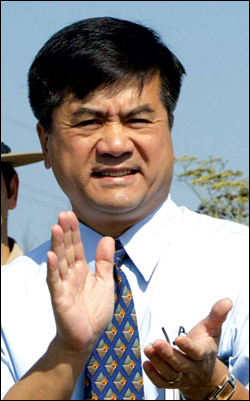Hey, Gary Locke, get out of my voting booth!
Last week, our lame-duck governor decided to make it impossible for me and many other Washingtonians to vote the way we want. He vetoed portions of a bill that would have created a so-called Louisiana primary system, in which the top two vote-getters advance to the general election regardless of party affiliation, which means we’ll get a Montana primary, in which we must choose a Democratic, Republican, or Libertarian ballot and are only allowed to vote for candidates of that party.
Admittedly, Locke didn’t create the problem. The three major political parties did. They won a lawsuit to have our 69-year-old blanket primary—in which we voted for whomever we liked, with the top vote-getters from each party advancing to the general election—tossed out, and that forced the state Legislature to come up with the Louisiana primary as a substitute. But while Locke isn’t entirely to blame, he sure is doing his best to make things worse.
If this whole thing seems a little abstract, let me try to bring it down to earth. The last time we had an election like the one we’re facing this year was in 2000. In the September 2000 primary, I had a helluva good time. I voted for a Democrat for U.S. Senate (Deborah Senn), a Green for Congress (Joe Szwaja), a Libertarian for lieutenant governor (Ruth Bennett), and a Republican for secretary of state (Sam Reed). I am a ticket splitter and proud of it—I chose the best candidates regardless of party. This September, if Locke has his way, I won’t be able to do that. Instead, I will go to my poll worker and say I would like a Democratic, Republican, or Libertarian ballot (so-called minor parties like the Greens will hold nominating conventions). In September 2000, that would have meant deciding if I wanted to be a Democrat for a day and vote for Senn, U.S. Rep. Jim McDermott (I was mad at him for sucking up to that sleazeball Bill Clinton), Lt. Gov. Brad Owen (whose use of his office to promote the War on Drugs I vehemently object to), and Snohomish County Auditor Bob Terwilliger for secretary of state (this was before he went crazy over electronic voting). If I had chosen a Republican ballot, I would have had to vote for U.S. Sen. Slade Gorton (Skeletor? No freaking way!). There was no Republican running for 7th District U.S. representative. There were a couple of oddball minor candidates for lieutenant governor. My other alternative would have been the Libertarian ballot—if I felt like wasting all my votes instead of just the one for lieutenant governor.
Locke says he’s doing this to preserve voter choice. Under the governor’s tortured logic, the most people vote in the general election. Therefore, it is most important to preserve choice in that election. The Legislature’s preferred solution, the Louisiana-style primary in which the top two vote-getters advance, might have meant that on the November general ballot, we could have two Democrats or two Republicans. If we were Louisianan in 1996, for example, we would have had Locke facing off against then–Seattle Mayor Norm Rice for governor.
There are three obvious points. First, while I am fully aware that we need electoral reforms to encourage greater voter participation (same-day registration, voting on Saturday instead of Tuesday, etc., etc.), the fact remains that if in September you can’t drag your lazy butt to the polls or fill out your mail-in ballot, you don’t get to complain about a lack of choices in November. Secondly, Locke knows damn well, because Reed has the data to prove it, that fewer voters will turn out for a Montana-style primary than would for the Louisiana primary, because Washingtonians aren’t big party people. Finally, the Louisiana primary would probably actually improve choices for seats in the Legislature for most Washingtonians. A majority of us live in so-called safe districts, where either Republican-leaning voters or Democratic-leaning voters dominate so much that the other party doesn’t even bother putting up candidates. Usually, my Seattle ballot features unopposed legislators. If we voted Louisiana-style, viable candidates might be encouraged to mount more intraparty challenges, so at least I could choose between two Democrats. (And over in Wenatchee, they could pick from a couple of Republicans.)
Moreover, apparently most of us prefer Louisiana to Montana. In December, an Elway Poll showed Washingtonians prefer Louisiana-style voting to Montana balloting, 56 percent to 30 percent.
If the Washington State Grange has its way, we’ll be able to demonstrate our preference in November. Initiative 872 would make the Louisiana primary the law of the Evergreen State. I know I’ll be voting for that one.
Washington State Grange, 360-943-9911, www.wa-grange.org.








